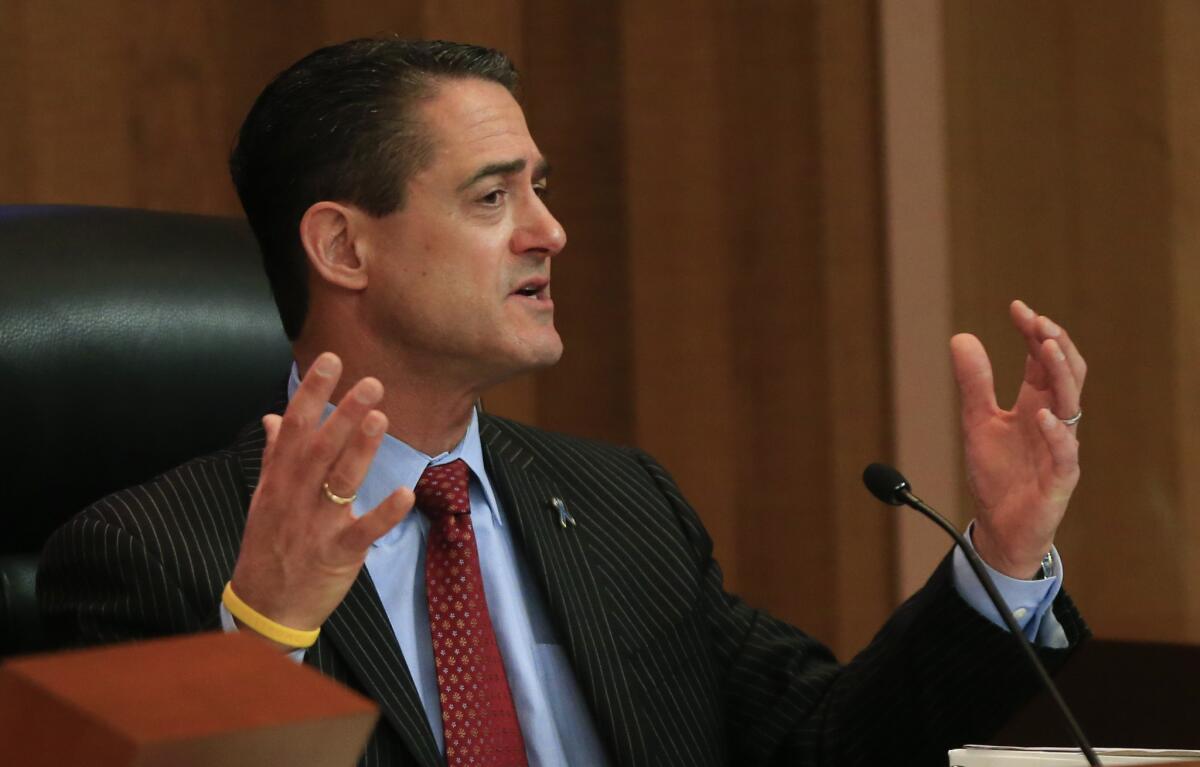Grand jury again urges Orange County to create an ethics panel

- Share via
When a grand jury described Orange County as a “hotbed of corruption” and called for the creation of an ethics commission, county supervisors dismissed the jury’s work as unfair, inaccurate and sensational.
When the grand jury followed up with a second report that took county officials to task for being more concerned with “covering up problems” than solving them, supervisors took action — by voting against a $20,000 increase to the grand jury’s budget.
Now the grand jury is back, and its message remains the same: It’s past time for California’s third-largest county to form an ethics commission to investigate wrongdoing.
In a report released last week, the grand jury called on county supervisors to put the matter before voters in the next general election.
“Ethics, campaign and lobbyist reporting oversight and enforcement in Orange County is deficient in a number of areas,” the report concluded. “An ethics body in Orange County would not be bureaucratic, unnecessary, irresponsible, or wasteful, as asserted by the Board of Supervisors.”
This time, the county’s leadership is leaning in the direction of reform. Supervisors are pushing for legislation that would allow the state’s Fair Political Practices Commission to investigate and enforce campaign finance laws in the county.
But whether that would leave room for an ethics commission is unclear.
Under legislation sponsored by Sen. Lou Correa (D-Santa Ana), Orange County would become the second county in California to let the FPPC enforce its existing finance law. San Bernardino County contracted with the state watchdog agency last year.
The grand jury, though, took issue with the county potentially contracting with the FPPC, saying it was concerned that the county’s finance law, one of the toughest in the state, would be invalidated because it’s far stricter than the state law.
Additionally, the FPPC would be limited to civil, not criminal, enforcement, the grand jury noted. It also expressed concern that the state agency’s independence from local officials could be compromised because its budget would be under the control of county supervisors.
Supervisor Shawn Nelson said the grand jury’s concerns are off target since Correa’s legislation contains language that would require the state agency to enforce Orange County’s existing finance law. Nelson said he was also put off by the estimated $500,000-a-year price tag of funding an ethics commission.
Nelson especially took issue with the grand jury’s fear that the FPPC would be under the Board of Supervisors’ thumb.
“The idea that Orange County supervisors would try and control a body up in Northern California appointed by Jerry Brown is ridiculous,” Nelson said. “How the hell would I control the FPPC?”
Nelson said he doesn’t disagree with the grand jury’s concerns but doesn’t believe creating an ethics commission would fulfill the county’s need for stricter oversight. Contracting with the FPPC and continuing to use the district attorney’s office as a tool for criminal prosecution would be a better alternative, he said.
Orange County Supervisor Todd Spitzer said he is not opposed to creating an ethics board, especially if it focuses on conduct and training elected officials.
“It’s long overdue in Orange County,” Spitzer said. “Most elected officials don’t know the basic rules about conflict of interest in campaign contributions; they’re really in the dark, and that’s unfortunate and it’s just ripe for people to get in trouble.”
Although he is pushing for the county to contract with the FPPC, Spitzer said he would also support the creation of an ethics commission.
“You have to keep a close eye on elected officials’ behavior,” Spitzer said.
An ethics commission is absolutely needed, said Jennifer Muir, a spokeswoman for the Orange County Employees Assn.
“Anything is better than what we currently have now, which is a free-for-all,” Muir said.
In its report, the grand jury described a lack of coordination between county agencies responsible for ethics and reporting enforcement.
“The grand jury raised some really good points about connecting the dots,” Muir said. “There has been a long history in Orange County of frankly pay-to-play practices.”
The grand jury said if supervisors don’t move forward with an ethics commission, they should at least establish an office of ethics and compliance charged with receiving complaints, monitoring and investigating possible ethics, law and policy violations.
Twitter: @AdolfoFlores3
Daily Pilot reporter Jill Cowan contributed to this report.
More to Read
Get the Latinx Files newsletter
Stories that capture the multitudes within the American Latinx community.
You may occasionally receive promotional content from the Los Angeles Times.







